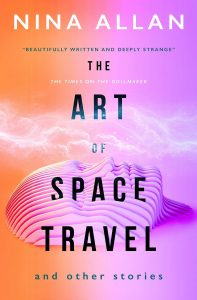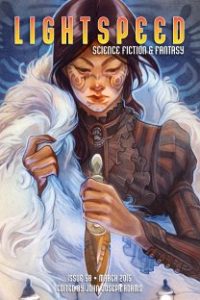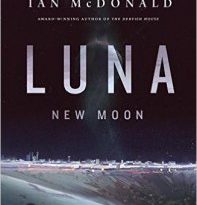Gary K. Wolfe Reviews The Art of Space Travel and Other Stories by Nina Allan
 The Art of Space Travel and Other Stories, Nina Allan (Titan 978-1-789091755, $15.95, 480pp, tp) September 2021.
The Art of Space Travel and Other Stories, Nina Allan (Titan 978-1-789091755, $15.95, 480pp, tp) September 2021.
Not very many lines of SF criticism get widely quoted, but Susan Wood’s long-ago observation that ‘‘Ursula K. Le Guin makes maps’’ is one of them, and it helped kick off a discussion of fantasy maps that isn’t over yet. It came to mind about halfway through Nina Allan’s major retrospective collection The Art of Space Travel and Other Stories, because Nina Allan makes webs. It’s not just that her website is called The Spider’s House, or that her BSFA-winning novella Spin was a retelling of the Arachne myth, or even that spider lore figures significantly in three of the stories here and is a central focus of one, ‘‘The Thread of Truth’’. It’s that Allan seems to view the web as a structural principal in a manner at least as useful as fantasy’s well-known cartographies, and as a sly way of forming connective tissue among her own stories, between her work and earlier SF, and even between real and imagined history. Her tales about horror movie actress Ruby Castle, reissued last year as Ruby, woven in and out of each other in such intricate patterns that the whole of the collection seemed much larger than any of its parts. Her recent novel The Dollmaker blends stories by a fictional Polish dollmaker into an almost picaresque tale of a contemporary dollmaker setting out across England to rescue a doll collector he sees as a kindred spirit, with all the various tales-within-tales forming a structure that’s better described as a pattern rather than a plot. And while not all the stories in The Art of Space Travel are linked (though we do see the same narrator showing up in pairs of tales, sometimes set decades apart), you end up with the uncanny sensation that there’s as much going on between the stories as within them.
This may have partly to do with Allan’s own contention, in her introduction, that she naturally gravitates toward novels rather than short fiction, and thus is curious about even minor characters and what their stories might be. The narrator and her friend in the lead story, ‘‘Amethyst’’, become curious about the meaning of a song that is apparently about their hometown, and we’re given enough hints about the music group and its lead singer that we’re just about willing to follow that narrative thread right out of the story, though the nominal focus is on the friend Angela and her growing obsession with the idea that aliens may have visited the town. ‘‘Amethyst’’ is also one of three stories reprinted from Allan’s debut collection in 2007, A Thread of Truth, none of which are materially fantastic, but all three of which share the haunting sense that SF or fantasy elements are hovering just beyond the edge of the story, trying to find a way in. ‘‘Heroes’’ takes place mostly in a village near Sheffield called Threep, where the young Fin learns to assist a rather reclusive figure named Marten with his racing pigeons; the whole setting has an oddly liminal feel to it. In ‘‘A Thread of Truth’’, one of the most haunting tales here, the narrator overcomes his fear of spiders by becoming a noted arachnologist. After he meets and begins to fall in love with a fellow enthusiast named Jenny, during a ‘‘spider-watching weekend’’ at a remote house in East Suffolk – M.R. James country, we are told – the group decides to share ghost stories, and Jenny relates a spooky tale of a mysterious young woman named Alice Chilcott and her lover; only decades later does the narrator realize the connection between Jenny and Alice.
The next few stories move us more unequivocally toward SF and fantasy. A filmmaker in ‘‘Flying in the Face of God’’ (filmmakers are recurring figures in these stories) has lost her mother during a sabotaged rocket launch and later makes a film on ‘‘the women of the Aurora Space Program’’, after seeking out a survivor of the program. In ‘‘Microcosmos’’, a young girl named Melodie is taken by her parents to visit an odd, reclusive man named Ballantine, who may be a relative and who ignites her curiosity by showing her paramecia through his microscope; decades later we meet Melodie again as the narrator of ‘‘The Common Thought, the Present Tense, the Known’’ (from Jonathan Strahan’s Drowned Worlds anthology), set in a convincingly postapocalyptic world – tens of millions killed in tsunamis, earthquakes, fires, and such – but also invoking Melanie’s memories of that long-ago visit. An even more dispiriting future is that of ‘‘Neptune’s Trident’’, in which two women survive mostly as scavengers in a future Scotland plagued by a terrifying parasitic condition called ‘‘the flukes’’ and constrained by something ominously (and spookily closer to home, now) called the Clampdown. Time travel – or at least time displacement – figures in ‘‘The Science of Chance’’, in which a little girl is found abandoned in a train station decades after she disappeared, and in ‘‘Marielena’’, with its apparently homeless vagrant who may be a visitor from the future (and an opening paragraph that seems to oddly echo the opening of Lolita).
The brilliant title novelette ‘‘The Art of Space Travel’’, which made it into multiple year’s best anthologies and earned a Hugo Award nomination, is set in the 2070s in a Heathrow hotel awaiting the arrival of astronauts preparing for a one-way mission to Mars. Emily, the head housekeeper at the hotel, finds herself increasingly preoccupied with her mother, a former physicist suffering from a form of dementia which may have been exacerbated by her role in investigating an earlier disastrous mission. Emily is also trying to learn about a father she never knew, who once owned a popular book called The Art of Space Travel, which has fascinated Emily since childhood. It’s an enormously affecting tale, and (in keeping with those webs), it’s linked to one of the most recent selections, ‘‘The Gift of Angels: An Introduction’’, narrated by a middling SF novelist named Vincent Colbert, who turns out to be the son of one of those Mars-mission astronauts. He’s also something of a film buff, and Allan’s ingenious blending of real and imagined film history, both here and in Colbert’s other narrated tale, ‘‘A Princess of Mars: Svetlana Belkina and Tarkovsky’s lost movie Aelita’’, raise intriguing critical questions about films like La Jeteé, 12 Monkeys, Solaris, Stalker, Aelita, and a couple of films and directors I’m pretty sure Allan just made up. The focus of the latter story, the only one original to the volume, is Colbert’s tracking down and interviewing a Russian actress who had supposedly been involved in a proposed Tarkovsky remake of the classic Soviet-era silent film Aelita. Here, as in the unrelated earlier tale ‘‘Four Abstracts’’, cast in the form of a critical discussion of four canvases by a close friend of the artist, Allan deploys such a tonally perfect critical voice that she nearly blurs the line between critical rumination and fiction, an effect that few other writers besides Borges have been able to bring off convincingly. The collection’s one unambiguous fantasy, ‘‘Fairy Skulls’’, brings the same cool analytical voice to what otherwise might be a regional folktale about a remote house in Kent infested with fairies called menniken. Like Allan’s other tales, it has tendrils extending well beyond its borders, and we come away from The Art of Space Travel with the odd but exhilarating feeling that we’ve encountered a lot more stories than the 14 listed in the table of contents, as impressive as those are.
Gary K. Wolfe is Emeritus Professor of Humanities at Roosevelt University and a reviewer for Locus magazine since 1991. His reviews have been collected in Soundings (BSFA Award 2006; Hugo nominee), Bearings (Hugo nominee 2011), and Sightings (2011), and his Evaporating Genres: Essays on Fantastic Literature (Wesleyan) received the Locus Award in 2012. Earlier books include The Known and the Unknown: The Iconography of Science Fiction (Eaton Award, 1981), Harlan Ellison: The Edge of Forever (with Ellen Weil, 2002), and David Lindsay (1982). For the Library of America, he edited American Science Fiction: Nine Classic Novels of the 1950s in 2012, with a similar set for the 1960s forthcoming. He has received the Pilgrim Award from the Science Fiction Research Association, the Distinguished Scholarship Award from the International Association for the Fantastic in the Arts, and a Special World Fantasy Award for criticism. His 24-lecture series How Great Science Fiction Works appeared from The Great Courses in 2016. He has received six Hugo nominations, two for his reviews collections and four for The Coode Street Podcast, which he has co-hosted with Jonathan Strahan for more than 300 episodes. He lives in Chicago.
This review and more like it in the September 2021 issue of Locus.
 While you are here, please take a moment to support Locus with a one-time or recurring donation. We rely on reader donations to keep the magazine and site going, and would like to keep the site paywall free, but WE NEED YOUR FINANCIAL SUPPORT to continue quality coverage of the science fiction and fantasy field.
While you are here, please take a moment to support Locus with a one-time or recurring donation. We rely on reader donations to keep the magazine and site going, and would like to keep the site paywall free, but WE NEED YOUR FINANCIAL SUPPORT to continue quality coverage of the science fiction and fantasy field.
©Locus Magazine. Copyrighted material may not be republished without permission of LSFF.





